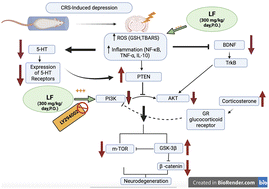Unleashing lactoferrin's antidepressant potential through the PI3K/Akt/mTOR pathway in chronic restraint stress rats†
Abstract
Depression is a widespread neuropsychiatric illness whose etiology is yet mysterious. Lactoferrin (LF), an iron-binding glycoprotein, is reported to promote neuroprotection through its role in the modulation of oxidative stress and inflammation. The objective of the present research was to evaluate the efficacy of LF against chronic restraint stress (CRS)-induced depressive behavior in rats. Depression was evidenced by a reduced grooming time in the splash test and an increased immobility time in the tail suspension test (TST) and forced swimming test (FST). This effect was also accompanied by reduced GSH and serotonin levels and elevated lipid peroxidation and corticosterone levels in the hippocampus. Additionally, an exaggerated hippocampal inflammatory response was also shown by a rise in NF-κB (p65) and TNF-α levels and a reduced IL-10 level. Moreover, CRS substantially reduced the BDNF content as well as the protein levels of PI3K, Akt, and mTOR while boosting the GSK3β content. Interestingly, LF therapy significantly improved CRS-induced behavioral and biochemical aberrations, an effect which was suppressed upon pretreatment with LY294002 (PI3K inhibitor). This suggests that the antidepressant potential of LF may be mediated through the modulation of the PI3K/Akt/mTOR signaling pathway. Furthermore, LF succeeded in restoring 5-HT and corticosterone levels, diminishing oxidative stress and ameliorating the inflammatory cascades. Therefore, and for the first time, LF might serve as a promising antidepressant drug through targeting the PI3K/Akt/mTOR pathway.



 Please wait while we load your content...
Please wait while we load your content...